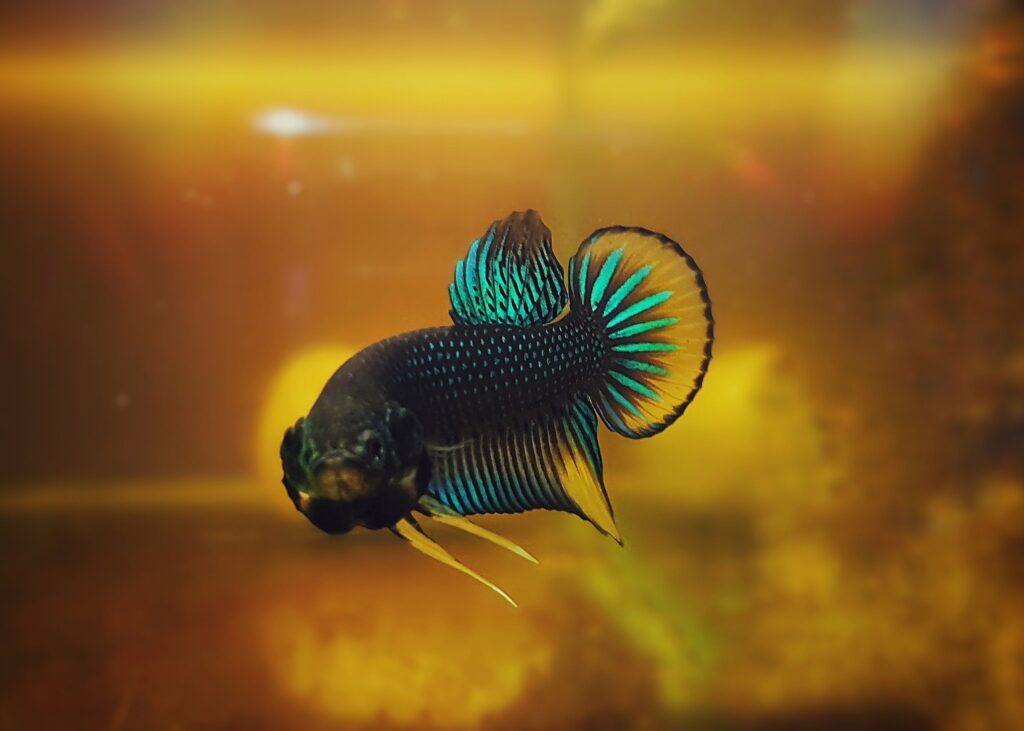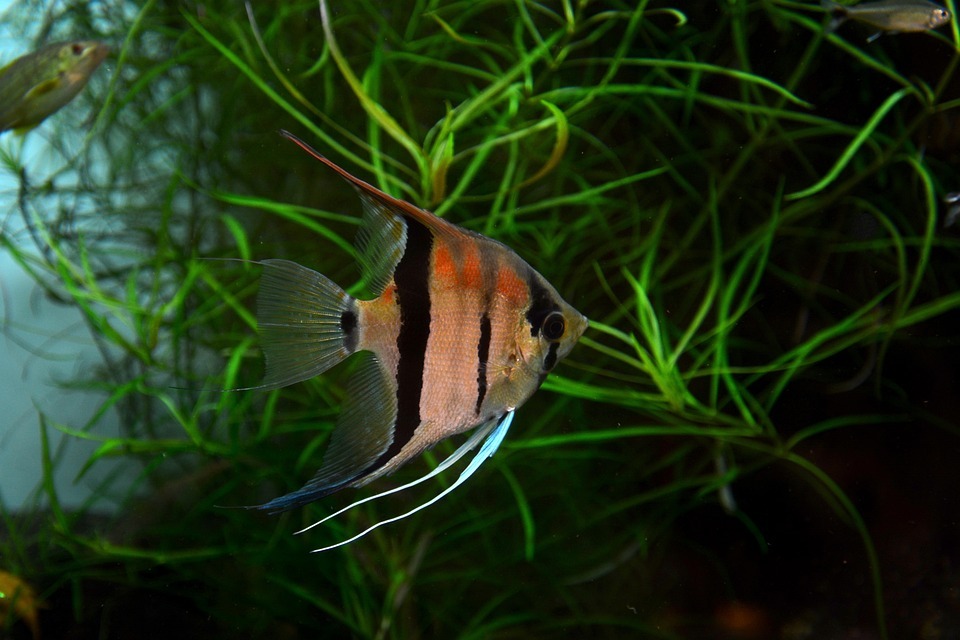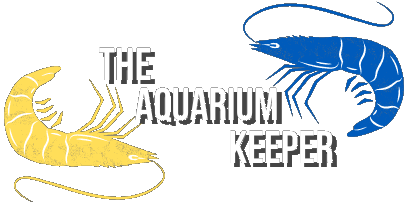
5 Best and Worst Cherry Shrimp Tank Mates

Writer at The Aquarium Keeper
Keeping cherry shrimp as pets is a great way to bring some unique energy into your home. Shrimp are very fun to watch, they have unique looks and reproduce like crazy. These little invertebrates are easy to maintain and have fairly simple dietary requirements.
However, because of their size, you will need to be careful with what fish you put in the same aquarium because some fish can see shrimp as tasty little snacks. Fear not, this article will break down the five best fish species that will do excellent with your shrimp, and five more bad fish species, that will devour your shrimp instantly.
Good Cherry Shrimp Tank Mates
Not every fish can live with cherry shrimp. Some bigger species will instantly see shrimp as food, which is why they cannot be kept together. Mainly small nano fish and other small invertebrates can be kept with cherry shrimp.
Although some people find success keeping bigger fish with shrimp, these are rare instances, and we do not recommend housing shrimp with other larger species, that have aggressive and predatorial tendencies. Keep reading to find out the best tank mates for cherry shrimp!
Chili Rasboras
Chili rasboras are some of the most colorful freshwater fish on the market. The vibrant red, blue, and orange coloring on their fins (and the occasional yellow or black) is what makes them so unique.

They are native to Southeast Asia, so they enjoy tropical water, the same as cherry shrimp. Rasboras are also easy to take care of, and they eat very little, making them a great choice for a shrimp tank. Chili rasboras are very peaceful and should not bother your shrimp at all. If you are planning on keeping them, follow these guidelines to ensure the best environment for them:
- Water Temperature: 20–28 °C (68–82 °F)
- pH: 4.0–7.0
- Tank Setup: A filter and a heater is needed to keep chili rasboras. These little species also enjoy lots of live plants and hiding spaces. Lightning can be low or moderate.
- Preferred Stocking: At least 6 in a 5-gallon tank. Chili rasboras are schooling fish, they feel safer and better in larger numbers.
- Minimum Tank Size: 5 gallons would be enough for 6 chili rasboras if housed alone. 10 gallons would be appropriate if chili rasboras are going to be kept with cherry shrimp.
- Diet: Chili rasboras enjoy a vast majority of food because they are omnivores. They eat pellets, flakes, frozen brine shrimp, and blood worms.
- Care Level: Easy
Chili rasboras can sometimes be shy due to their size, and the coloration of these fish is highly affected by the conditions that they live in. To get the most out of these little species, please ensure the best conditions, so that they can feel safe and look good.
Celestial Pearl Danios
Celestial pearl danios or galaxy rasboras are another colorful option to go alongside your cherry shrimp. They have a silver-blue body with red and orange fins and white dots that cover the whole body.

Celestial pearl danios are a popular fish among aquarists because of their vibrant coloring and small size. They are great fish to keep with shrimp because they are one of the few fish species that won’t eat them. They are peaceful, active swimmers that will keep your aquarium lively.
Celestial pearl danios are quite hardy species, that can tolerate a wide range of water parameters. They are tropical fish, which means they are compatible with cherry shrimp. Although it is important to know the best possible tank parameters for these species:
- Water Temperature: 22–26°C (72–78 °F)
- pH: 6.5–7.5
- Tank Setup: Galaxy rasboras need a heater and a filter to thrive properly. These species also enjoy lots of live plants and hiding places, that replicate their natural environment. Lightning can be low to moderate.
- Preferred Stocking: At least 6. Celestial pearl danios like to school, they feel less stressed in bigger numbers. Male to female ratio should be 1:2, because males can become territorial and aggressive towards each other.
- Minimum Tank Size: 6 galaxy rasboras can be kept in a 5-gallon tank. In this case, if you are planning on housing these species with cherry shrimp, you would need at least 10 gallons for 6 galaxy rasboras and a handful of shrimp.
- Diet: Galaxy rasboras can eat a lot of different food because they are omnivores. They like flakes, pellets, frozen brine shrimp, blood worms, and other live or frozen foods, that have lots of nutrients.
- Care Level: Easy
Similar to chili rasboras, celestial pearl danios show brighter colors when they are feeling safe and eating good food. Try to create good conditions to ensure the health of your amazing aquarium fish.
Pygmy Corydoras
These little fish are native to South America, making them a great choice if you are trying to keep them with cherry shrimp since both species like tropical water. Pygmy corys are very social and will thrive when kept in groups. They are bottom-dwellers, that sometimes occasionally swim in the middle area of the aquarium.

Pygmy corydoras will compete for food with your cherry shrimp, but there should not be any aggression towards each other. You can see both species sometimes pushing each other for food at the bottom, which is a fun sight to see. Pygmys are the smallest corydoras species, but they are relatively hardy. These are the best tank conditions:
- Water Temperature: 22–26°C (72–78 °F)
- pH: 6.5–7.5
- Tank Setup: Just like in every aquarium, a heater and a filter are needed to ensure the safety and well-being of the fish. Pygmy corys are bottom dwellers, so natural sand is the best option for them when it comes to the substrate. Pygmys can sometimes be shy, so live plants and hiding places are very beneficial.
- Preferred Stocking: At least 6 in a 10-gallon tank. Pygmy corys are very social creatures and feel way safer and less stressed in bigger groups. If you have a big tank, keep more of them.
- Minimum Tank Size: 6 pygmy corydoras can be kept in a 10-gallon tank with some shrimp. You should not go with a smaller tank with these species, because they thrive on the bottom of the tank, which sometimes can be crowded with decorations in a smaller aquarium.
- Diet: Pygmy corydoras can eat frozen brine shrimp, blood worms, pellets, and other leftover food, that falls to the bottom.
- Care Level: Easy
Just remember that pygmys are relatively tiny in size, and can be shy at first and hide in all sorts of plants and other places. Give them time to adjust to their new surroundings.
Nerite Snails
Nerite snails are a unique addition to any aquarium. They are native to rivers in Asia and are often kept in freshwater aquariums as an alternative to fish that would help clean up aquarium detritus.

Nerites are very peaceful and also enjoy tropical waters, the same as cherry shrimp. They can’t pose any harm to your cherry shrimp, which makes them the perfect companion, and the amount with the lots of different nerite snail types in the hobby, you can choose the one that fits your personal taste the most.
Nerites are very easy to keep, but it is sometimes hard to tell if they are healthy or not. That is why it is important to know the best conditions in which these species thrive:
- Temperature: 22–26°C (72–78 °F)
- pH: 8.1–8.4
- Tank Setup: Filter is a must when keeping snails because they produce waste like every aquatic creature. A heater is also required because it helps to sustain the right temperature. Snails do not really care about their environment, but sand as a substrate is best for their mobility. Plants can be also beneficial since they help clean water. Lightning can be low or moderate.
- Preferred Stocking: 1 snail can easily live in a 5-gallon tank.
- Minimum Tank Size: You can house a maximum of 1 nerite snail with a handful of shrimp in a 5-gallon aquarium. If you want more snails, a bigger one is recommended.
- Diet: Nerites are herbivores, which means they love eating algae and decaying plants! You can feed them boiled vegetables and algae wafers.
- Care Level: Easy
Neon Tetras
Neon tetras are a great choice for a cherry shrimp tank thanks to their small size and the vibrant coloring on their bodies. Tetras are known for being very social, and they thrive in large groups.

Although sometimes neons can nip other fishes, they do just fine with cherry shrimp. Neons usually stay in the mid-section of the tank, while shrimp are thriving at the bottom. These are the preferred water parameters for these species of fish:
- Temperature: 22–25°C (72–76 °F)
- pH: 6–7
- Tank Setup: A filter and a heater is needed for keeping neon tetras. The aquarium itself should be long because neons are fast swimmers and enjoy a lot of space. These species also like live plants and a lot of hiding places, because sometimes they can feel shy.
- Preferred Stocking: At least 6 in a 10-gallon tank.
- Minimum Tank Size: You can keep 6 neon tetras in a 10-gallon tank alone, but if you want to keep them with shrimp, we would recommend at least 20 gallons.
- Diet: Neons like eating frozen blood worms, pellets, flakes, and brine shrimp.
- Care Level: Easy
At first, neons can be very shy when introduced to a new aquarium. They tend to group up and hide, but if the conditions are good, they become very interactive and social little creatures.
Bad Cherry Shrimp Tank Mates
Not every fish can live with cherry shrimp. Many larger species would instantly devour shrimp if they had the chance because they try eating everything that fits in their mouth. I made a list of the most popular larger-than-nano fish species, that can’t be housed with cherry shrimp.
Betta Fish
A lot of new aquarists tend to ask if betta fish can live with cherry shrimp. Some people try this combination and succeed, and others end up feeding their betta an expensive snack.

We simply do not suggest housing betta fish with cherry shrimp. Every betta has a different character, if one person has success keeping these two species together, it does not mean that you will have the same success.
Some bettas are very aggressive and kill every fish and living thing in their aquarium, and others tend to not even care about other live beings in their presence. That is why we do not recommend keeping betta fish with cherry shrimp.
Dwarf Gourami
Similar to betta fish, some dwarf gouramis can have an aggressive character, and others can be more passive. There is no consistency, which is why it is not safe to house cherry shrimp with dwarf gouramis.

Simply put it, gouramis will try to eat everything that can fit in their mouth, and smaller-sized shrimp will definitely be their food. Do not keep shrimp with dwarf gouramis in the same aquarium.
Angelfish
There are a lot of different types of angelfish, but every single species are very big and can easily consume shrimp. That is why we do not recommend housing the two species together.

Angelfish do not go well with smaller fish also, because they can become more aggressive during their breeding season, and eventually when angelfish grow bigger, they start seeing smaller living beings as food.
Pea Puffer
Pea puffers are predators in nature. They hunt bugs and other small creatures they can devour. Pea puffers love eating pond snails, and certainly would consume any cherry shrimp they could get.

Pea puffers are notoriously aggressive fish, and can only be kept within species tanks. If you are still considering keeping cherry shrimp with pea puffers, they will definitely turn into a tasty and expensive snack in no time.
Writer's Thoughts And Personal Experience
Cherry shrimp are a great species to keep in your aquarium if you are looking for something out of the ordinary. They are very easy to take care of, produce very little waste, and are fun to watch.
Personally, I would strictly stick to keeping cherry shrimp with nanofish. They are highly compatible, and there is a good variety to choose from. If you can’t find a nanofish that catches your eye for your shrimp tank, maybe consider keeping only shrimp.

Thank you for reading my blog post. This website was created with the sole intention of providing quality information regarding fishkeeping. I have been in the fishkeeping hobby for 8 years, and through many trials and errors as well as online research I gathered a lot of information, which I want to give back to the community.





